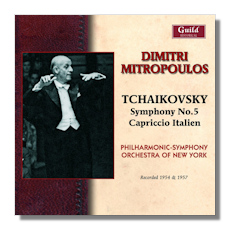
The Internet's Premier Classical Music Source
Related Links
- Tchaikovsky Reviews
- Latest Reviews
- More Reviews
-
By Composer
-
Collections
DVD & Blu-ray
Books
Concert Reviews
Articles/Interviews
Software
Audio
Search Amazon
Recommended Links
Site News
 CD Review
CD Review
Piotr Ilyitch Tchaikovsky

- Symphony #5 in E minor, Op. 64
- Capriccio Italien in A Major, Op. 45
Philharmonic-Symphony Orchestra of New York/Dimitri Mitropoulos
Guild GHCD2396 Mono/Stereo
These performances were originally released on Columbia, and to my knowledge, Sony Classical has done nothing with them except than to pass them to Guild for this disc. I don't really blame them, there are some exceptional Tchaikovsky performances in house. In fact, all three major Columbia artists – Szell, Ormandy, and Bernstein – recorded these three works exceptionally well during that label's golden age. So this mono account has done what most do, and has languished for decades, much like the Mitropoulos' own reputation. Guild has my thanks, though, since this disc is mostly excellent.
Mitropoulos really moves the Fifth Symphony along, pushing forward with an uncommon sense of urgency. The result is by turns exciting and a bit sloppy. The conductor, like many in his generation, wasn't especially known for discipline. But when it's good, it's really good. The New Yorkers are in really fine form, with the winds balanced forwardly and playing with commitment. The Andante isn't rushed, but it too moves purposefully forward. The French horn solo is not the best ever, but the orchestral backing is lovely. While the strings aren't the most polished, I find their momentum and unusual strength appealing. The climax at the heart of the movement however, is severely limited by the otherwise acceptable engineering, and it feels a little underplayed.
A measured, but still aptly flowing waltz follows. Again, there is a real thrust that propels everything even at a slightly slower tempo. The rapid runs in the strings here could be a touch more incisive, but otherwise, the music moves smartly along. The finale is launched with an initial hesitancy that I really like, one that allows the theme to rebuild in power. Elsewhere though, I'm a little less convinced. Mitropoulos and his orchestra engage in some tempo shifts and pauses that not everyone seems to agree on. And the forward balance of the winds – and everything else – seems to disappear. As the movement progresses, the sense of cogency diminishes. It's an odd finish to an otherwise engaging reading.
The Capriccio Italien is in early stereo. As with the symphony, this isn't the tidiest reading around, it's a little too boisterous for its own good here and there. I really love the swagger and panache; I'm less than thrilled about some brass playing here and there that borders on ugly. Mitropoulos does manage to keep things interesting with all kinds of wonderful detail in the strings and winds. He also saves the last bit of speed for the final bars, building the work more carefully than most. It's so different than the speed-demon renditions we hear today, and it's all the more convincing because of the seriousness that conductor and orchestra bring to the table. In short, a valuable release, warts and all.
Copyright © 2014, Brian Wigman





















